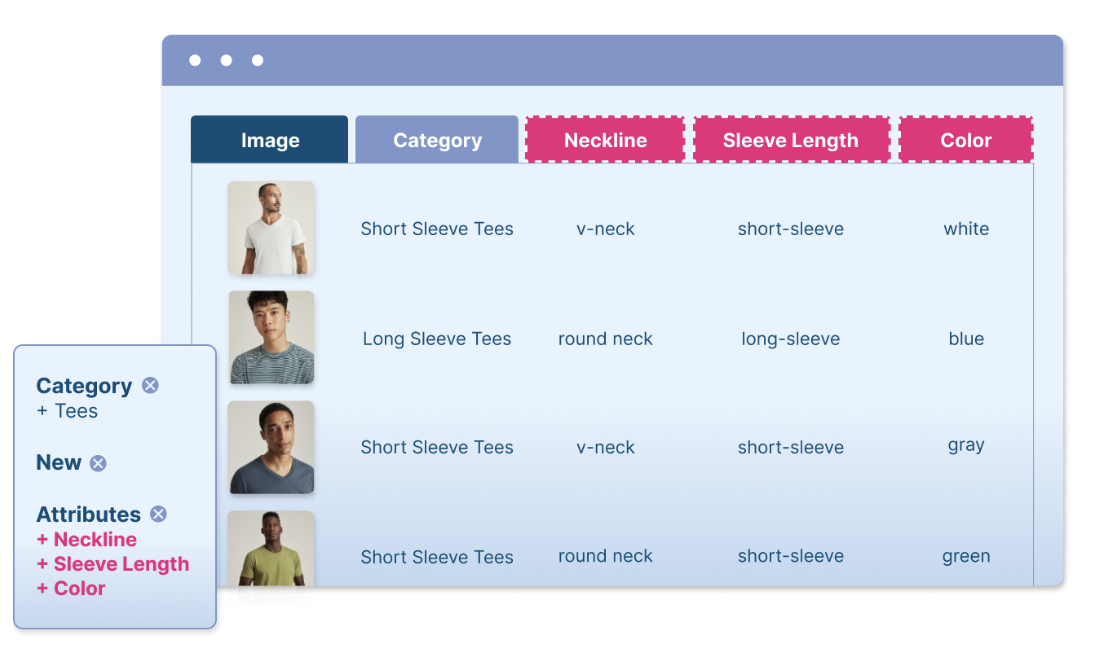In this guest article provided by Akeneo partner Constructor, delve into the challenges retailers face with data accuracy and integrity and discover how to automate product data tagging, ensuring a structured catalog, improved customer experiences, and a competitive edge in the dynamic eCommerce landscape. Explore the power of composable eCommerce solutions, where Akeneo's PIM meets Constructor's Attribute Enrichment for standardized, complete, and highly accurate product data, paving the way for a streamlined, efficient, and competitive online presence.

Table of Contents
Keywords
In this blog post, we explore the challenges associated with product data, focusing on the common problems retailers face and how Constructor’s Attribute Enrichment addresses these issues, resulting in more accurate and usable product data and a better customer experience.
Managing product data is no small feat. Product information originates from various sources such as supplier spreadsheets, ERPs, eCommerce platforms, and Product Lifecycle Management (PLM) systems, where product teams input data during the design phase. As a result, data completeness and standardization can vary significantly between different vendors and product categories. This not only contributes to a less-than-ideal customer experience, but can also result in missed revenue.
For example, a general merchandise retailer may carry both electronics and clothing. As you might imagine, the product data for these two categories will differ significantly. This is complicated by the fact that electronics often require highly specific technical attributes like screen type, memory capacity, resolution, and special features whereas clothing might have general attributes for categories like tops, bottoms, and footwear.

And when it comes to B2B commerce, these challenges are multiplied. It’s not uncommon for B2B eCommerce catalogs to contain millions of SKUs — in many cases with numerical data like measurements or part numbers. When that data is inaccurate or missing, the outcomes can be devastating: both for the B2B companies that rely on high-volume bulk orders and for their customers, for whom speed and accuracy is critical to deliver on time.
With thousands or millions of products from hundreds of different brands in hundreds of different categories, how can retailers make sure that their product data is accurate and complete for the category of product and for the attributes that matter most to customers?
What if a shirt is manually tagged as purple when it’s actually blue, or what if a soup is tagged as vegan or gluten-free when it’s actually not?
Modern PIM systems like Akeneo can detect and alert eCommerce teams when product data is missing, inconsistent, or inaccurate. However, fixing the issue effectively is another story. Especially with large volumes of data, allocating resources to manually fix missing or inaccurate data is expensive. Human intervention can also introduce errors, making the process unreliable. A recent MIT study confirmed that human data tagging contains errors to the effect of, on average, 3.5%.
When it comes to product discovery, the challenge also goes beyond data completion; it’s about understanding your customers’ preferences and language and making sure your product data reflects them accurately. Without a clear understanding of which attributes matter most to shoppers, manual efforts to correct data could end up being a waste of time.
It’s here where Constructor’s Attribute Enrichment comes into play. Revolutionizing the way product data is enriched, Attribute Enrichment combines Constructor’s existing AI capabilities with innovative Machine Vision and Text Classification algorithms.
The result? An automated system that tags products with new, relevant attributes and categories daily, enhancing data accuracy and maintaining a structured and consistent product catalog. This is a game-changer for retailers, as it significantly improves customer experiences and drives sales and competitiveness in the eCommerce landscape.

The advantages of Attribute Enrichment extend across various aspects of your business. Here are some of the key benefits:
Constructor’s Attribute Enrichment is a specific solution to address the challenges of managing product data in today’s complex eCommerce environment. By combining Akeneo’s PIM capabilities with Constructor’s AI-driven Attribute Enrichment, businesses can achieve standardized, complete, and highly accurate product data. This partnership offers a composable solution that is API-first, making it easier to integrate across various platforms. The result is a more streamlined, efficient, and competitive ecommerce presence — with the power of product data at its core.